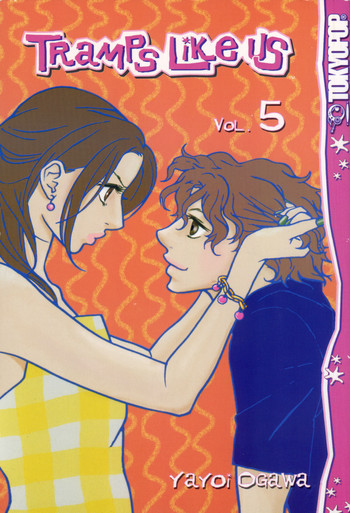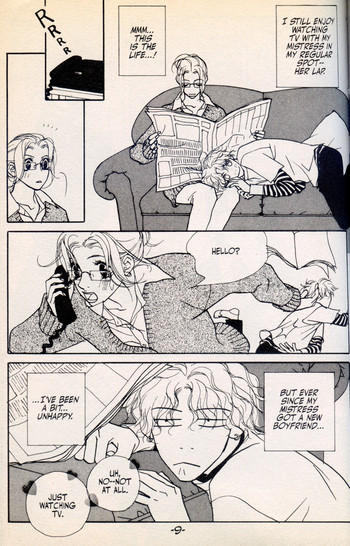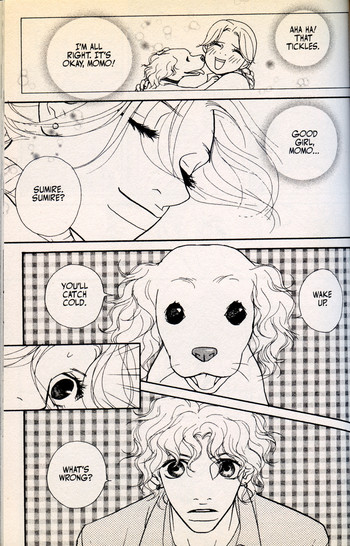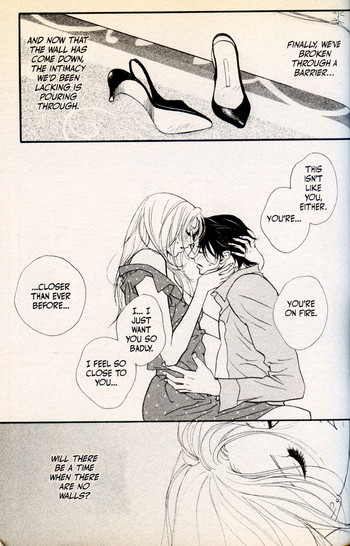House of 1000 Manga
Tramps Like Us
by Shaenon K. Garrity,


Shojo manga used to be feminist. Stop laughing over your copies of Black Bird and Midnight Secretary—I swear it's true. The gang of young female creators who took over girls’ manga in the 1970s were hip to the social and political issues of the day. They explored women's rights as well as broader questions of sexual identity, sexual freedom, and traditional gender roles. They wrote gender-bending comics to test the meaning and limits of gender. Keiko Takemiya, creator of the classic Song of the Wind and Trees, called boys’ love manga a “first step toward true feminism.” When I interviewed Moto Hagio at the San Diego Comic-Con in 2010, she expressed surprise that there weren't more American comics aimed at girls—especially stories about beautiful men. “Feminism is supposed to be more advanced here in the U.S.,” she commented, “but are there still some things that cannot be said?”
But in the 1980s Japanese culture got more conservative, and manga increasingly lost interest in social justice movements and youth revolutions. Nowadays, shojo manga still has the beautiful boys and the gender-bending, but—with notable exceptions—it's lost the status-quo-challenging philosophy behind them.
Ah, but what about josei, manga for older female readers, a category that grew out of the more daring and mature shojo manga of the revolutionary period? Josei has come a long way since the late 1980s, when it was often conflated with pornographic “ladies’ comics” and seen as soapy entertainment for bored housewives. It would be a stretch to say that most modern josei romances make deep statements about the human condition; if you haven't waded through the vast body of untranslated josei, let's just say there are a lot of rapey workplace sex fantasies going on.

But just as many excellent American novels get slapped with the “chick lit” label and high-heel-shoe cover because some publisher decided they can move more copies that way, the very broad category of contemporary josei includes amazing, often massively under-appreciated work. Frankly, if a josei title gets an official English translation, you should probably read it, because josei is a hard sell in the U.S. and it usually has to be exceptionally good to get picked up at all. (Or have vampires. Everyone loves vampires.) And I have now wasted several paragraphs trying to explain my love of Tramps Like Us, an early-2000s josei manga that's a heady mixture of contemporary romance, real-world social issues, soap opera, hot fantasy men, gender role reversal, and, yes, feminism.
Sumire is a brilliant, leggy, hard-headed reporter climbing the corporate ladder like she was born for it—although, as we learn in flashbacks, she's secretly an awkward nerd who only blossomed into an ice-queen hottie in adulthood. From the outside, Sumire looks flawless, but of course on the inside she's a neurotic mess, and one of her biggest problems is finding a man who isn't intimidated by her. After her latest boyfriend, a guy who always felt inferior, cheats on her, Sumire resolves to date only guys who have the “three highs” Japanese women are supposed to look for: higher pay, higher education, and higher height. It's a tall order, no pun intended, for a woman who attended both Harvard and Tokyo University, is rapidly rising to the top of a major newspaper, and is built like a runway model. (She's 5'6”, about as tall as the average Japanese man, although my 5'10” self always laughs darkly at the manga idea what's “too tall” for a woman. See also Love*Com.)

It's a simple, logical plan, so naturally fate must screw with it. One evening, after a lousy day, Sumire finds a cute young homeless guy sleeping in a cardboard box outside her apartment. She takes him in but insists there's nothing sexual about it; after all, he doesn't have a single one of the three highs. Instead, she agrees to keep him as a “pet,” allowing him to live with her in exchange for his doting attention. She even names him Momo after her beloved childhood dog. Hence the Japanese title of the manga, Kimi wa Petto (You Are My Pet), which Tokyopop changed in one of the most baffling localization choices I've ever encountered. I don't mean it's baffling that they changed the title for no apparent reason; that happens all the time. I mean that they changed it to something requiring music industry permissions, the most pain-in-the-ass rights to obtain. Why would anyone do that to themselves?
Tramps Like Us plays with the kinky subtext (okay, text) of this relationship, but it's more interested in the way the arrangement challenges traditional gender roles and what even modern, liberated Japanese women are raised to expect from a man. Not only is Sumire older, taller, more powerful, and in the dom role, she has a blunt attitude and a raft of macho-geeky hobbies like video games and pro wrestling. She beats up muggers with her martial arts skills, while her more feminine best friend—already married with a toddler—tries and fails to teach her the secrets of fascinating womanhood. On the distaff end, the petite, doe-eyed, submissive Momo is…wait for it…a ballet dancer. Could there be a more girly profession? Or are the stereotypes all wrong? Maybe a smart woman who plays video games is the perfect girl for the right guy. Maybe a male dancer is, how can we put this delicately, flexible.

“Yes, Sumire!” cries my Free to Be You and Me-raised feminist heart. “Defy cultural gendered expectations! Smash the patriarchy by getting with this hot young thing!” Of course it's not going to be that straightforward. At work, Sumire starts up a romance with Hasumi, a man who has all the highs and then some, and also happens to be her old college crush. Back then she was a hopeless nerd, but now she's got a chance with him—and that would be a happy ending too, wouldn't it? If this manga were written by a man, Hasumi would almost certainly turn out to be a handsome jerk out to break Sumire's heart, but Yayoi Ogawa isn't about to make the love triangle that simple. Hasumi is a genuinely nice guy who falls hard for Sumire and is soon talking about marriage. That means Sumire has to make a choice—and decide how long to keep telling increasingly dirty little white lies about the “dog” in her apartment. Meanwhile, both the men in her life attract other women—Momo a cute fellow ballet student, Hasumi a scheming dental assistant—because, let's face it, they're awesome.
Sumire falls in love with Hasumi, and for a while they have a picture-perfect romance, save for the secret of Momo. But love with Hasumi means constantly maintaining her flawless image, worrying about screw-ups, struggling to be an alluring girlfriend. It's hard not to crave comfy evenings on the couch with Momo, chain-smoking and watching trashy TV. Ultimately, Sumire will have to decide not only what she wants in a man, but what she wants out of love and life. Meanwhile, there's plenty more going on in the characters’ lives than their romantic entanglements: journalism, ballet, office politics, trips to Europe and Hong Kong, friendships that wax and wane.
Ogawa's art is fairly standard for 2000s-era josei, all long legs and pouty lips. She's best at drawing the main characters and their personalities; I especially like the way Sumire flips between sleek business-suited sexpot and gangly nerd, and the design of Sumire's married friend, who was the class hottie when they were younger but is now comfortably letting herself go (and arguably looks cuter with glasses and a few extra pounds). Unlike a lot of shojo and josei artists, Ogawa isn't afraid to draw action, whether it's a sweaty dance recital or Sumire busting out pro-wrestling moves on some mooks. But mostly the art is there to move the story along and provide a window into the characters’ minds.
Tramps Like Us is soap opera, chick lit, rom-com, rich bittersweet fantasy. The people are beautiful, the jobs glamorous, the men fantastic and doting. But it also has things to say about the real world: about the roles people are expected to play and the decisions they have to navigate to find happiness. It's a rare manga that can be goofy and sexy and thoughtful at the same time, and maybe that's why I keep thinking about this one long after finishing it.
discuss this in the forum (12 posts) |